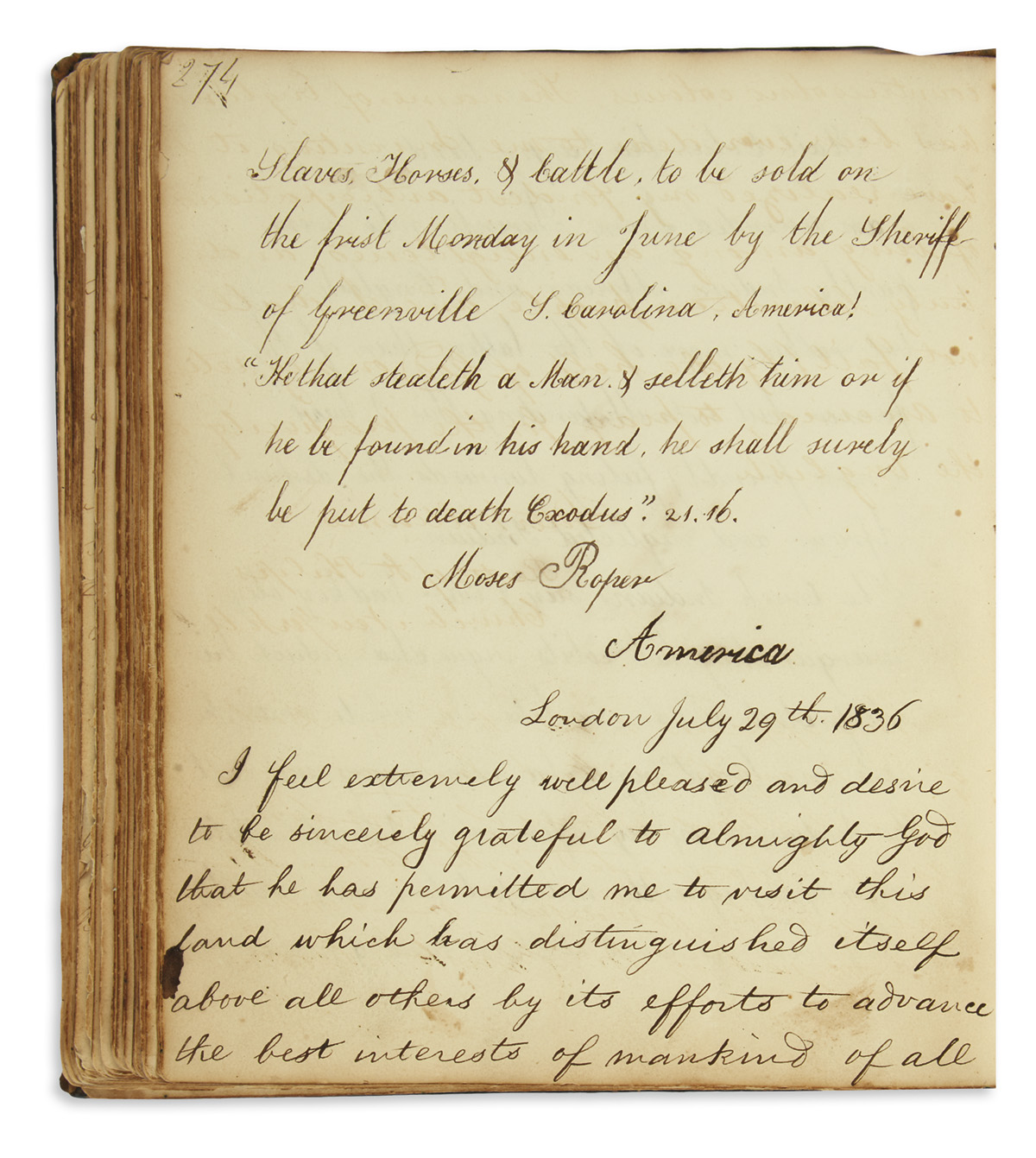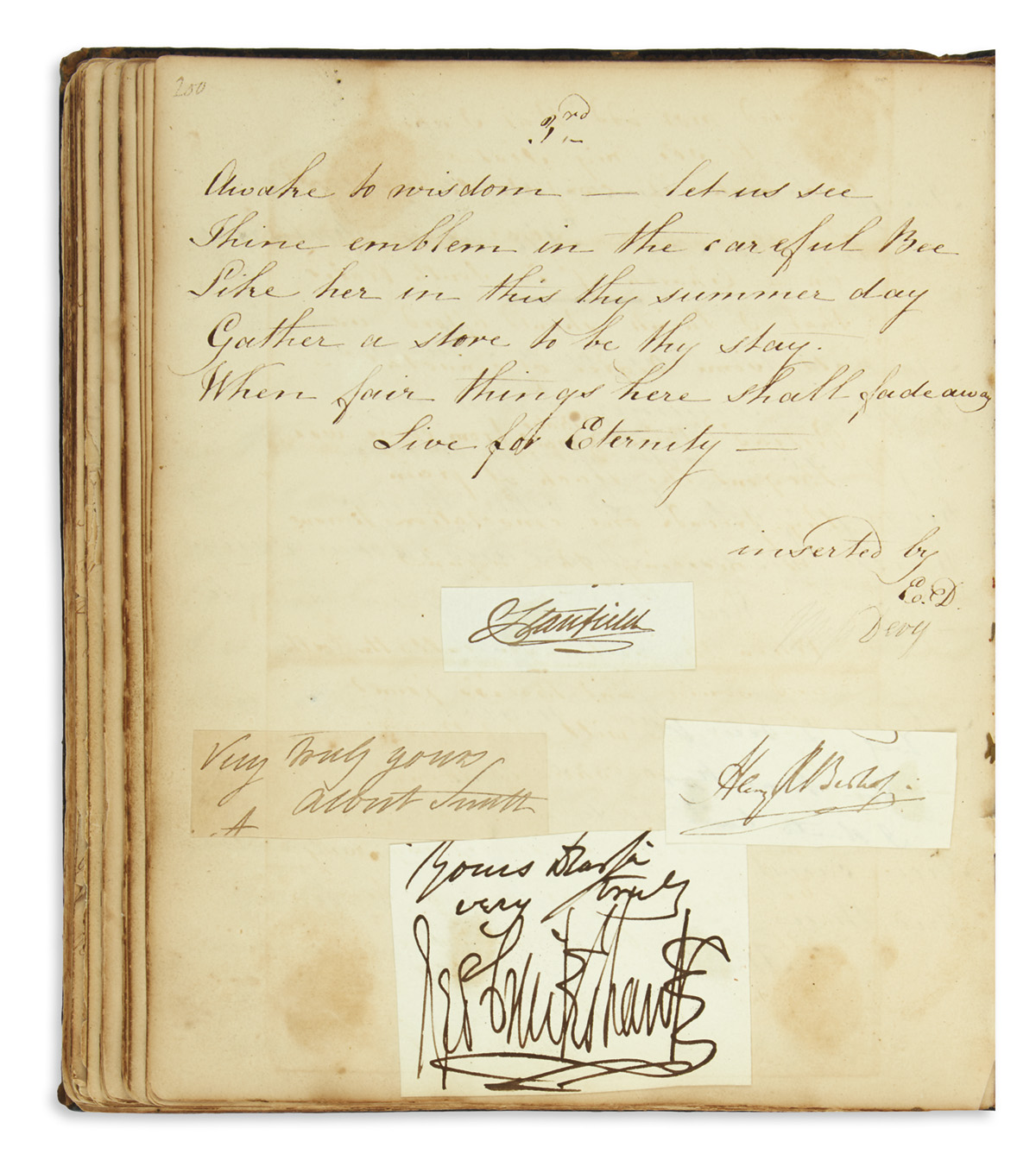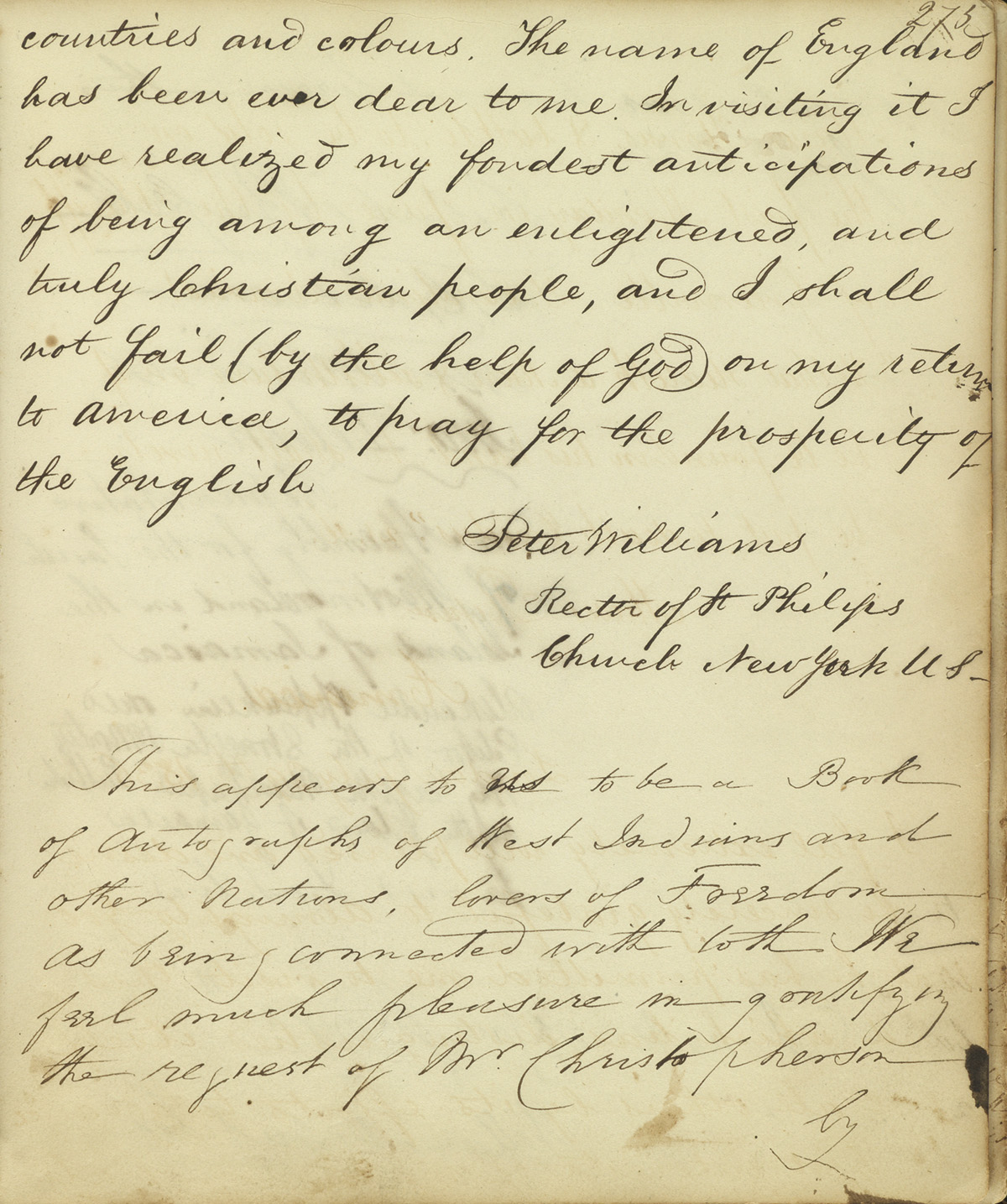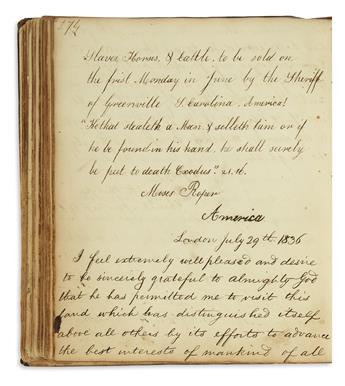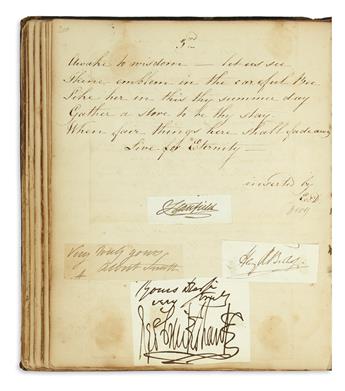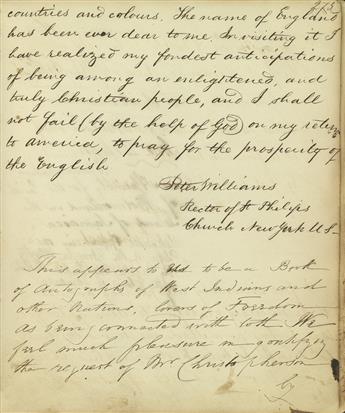Sale 2534 - Lot 40
Price Realized: $ 5,200
Price Realized: $ 6,500
?Final Price Realized includes Buyer’s Premium added to Hammer Price
Estimate: $ 10,000 - $ 15,000
(SLAVERY AND ABOLITION.) Autograph book including inscriptions by noted early African-American orators Moses Roper and Peter Williams. 307, [6] manuscript pages including numerous mounted clipped signatures and letter fragments. 4to, contemporary calf gilt, worn; coming disbound, 7 leaves excised. London and vp, 1821-40 and 1854
Additional Details
This autograph album was apparently compiled by Henry Christopherson (born 1798-1862) of London and his wife Harriet Wallis Christopherson (1804-1847), who emigrated to Canada in the 1840s. One later entry was supplied by their son Hall Christopherson (1836-1880) in 1854.
One of the signers, Moses Roper (circa 1815-1891), escaped from slavery in Georgia in 1834. He sailed for England in November 1835, where he became a well-known author and abolitionist lecturer. The inscription by Roper fills page 273 and half of 274. It reads "Hail Columbia, happy land! I am descended from parents who were partly Indian, African, and English, but rather more of the latter than of the former, but notwithstanding this I have a most friendly feeling towards the despised African and neglected Indian. The Creek Indians say . . . 'I do not like the white man, he stole my land,' . . . and well the Indian may say so, for when I lived in their vicinity they were deprived of their land & property, slaves, horses & cattle, to be sold on the first Monday in June by the sheriff of Greenville, S. Carolina! 'He that stealeth a man & selleth him, or if he be found in his hand, he shall surely be put to death.' Exodus 21:16. Moses Roper." His entry is undated, but is immediately followed by two inscriptions made in London on 29 July 1836. The preceding several pages are also undated, but that last previous dated inscriptions were March and April 1835.
The Roper entry is followed immediately by another important entry by the Rev. Peter Williams (1786-1840), founder and rector of the Free African Church of St. Philip (New York's first African-American church), who writes: "London, July 29th 1836. I feel extremely well pleased and desire to be sincerely grateful to almighty God that he has permitted me to visit this land which has distinguished itself above all others by its efforts to advance the best interests of mankind of all countries and colours. The name of England has been very dear to me. In visiting it I have realized my fondest anticipations of being among an enlightened and truly Christian people, and I shall not fail (by the help of God) on my return to America, to pray for the prosperity of the English. Peter Williams, Rector of St, Philips Church, New York, U.S." Williams was one of the leading African Americans of early 19th century New York, and author of the important abolitionist pamphlet "An Oration on the Abolition of the Slave Trade" (1808).
After the Williams entry is another from a group of Jamaican visitors to London who wrote "This appears to us to be a book of autographs of West Indians and other nations, lovers of freedom. As being connected with both, we feel much pleasure in gratifying the request of Mr. Christopherson by subscribing our names herein this 29 July 1836." It is signed by 4 "representatives in assembly for the parish of Westmoreland in the island of Jamaica" plus Alexandre Oppenheim as "editor of The Struggler, Montego Bay," James DaSilva and Thellamont DaSilva, who adds "I hate oppression."
Among the many other autographs pasted into the album are: a clipped signature of English abolitionist clergyman Thomas Raffles on page 79 Autograph Letter Signed from poet Robert Southey to an unidentified correspondent, Keswick, 8 March 1809, on page 126 and a letter fragment signed by the American poet Lydia Huntley Sigourney, undated, page 239. In addition to many dozens of other inscriptions and autographs, mostly by British clergymen, family members, and literary figures, the volume also functioned as a commonplace book in which the compilers compiled bits of favorite poetry. Many of the other entries in this volume entries are addressed to or inscribed by members of the Christopherson family.
The signatures of both Moses Roper and Peter Williams are rarely seen. We are not aware of any other Peter Williams manuscripts; none have been traced at auction or in OCLC. New York's Trinity Church does have an 1817 letter from Williams in its archive, though, and the handwriting is a strong match. His trip to England is referenced in the Royal Cornwall Gazette of 4 November 1836. Roper's manuscripts have proven yet more elusive. The signature does not closely resemble the only other example we have traced, which was published beneath his portrait in the frontispiece of his memoir. As Roper was just learning to read and write during this period, it would not be surprising for his signature to vary widely. His known close association with the Christopherson family, the original compilers of the album, is evidence of the inscription's authenticity. According to his memoir "A Narrative of the Adventures and Escape of Moses Roper," soon after arriving in London he was given a home by a Mr. Christopherson: "Throughout he has been towards me a parent . . . I stayed at his house several weeks, being treated as one of the family." He soon left to receive "the rudiments of an English education" in nearby Hackney, and delivered published addresses in London on 26 and 30 May 1836.
One of the signers, Moses Roper (circa 1815-1891), escaped from slavery in Georgia in 1834. He sailed for England in November 1835, where he became a well-known author and abolitionist lecturer. The inscription by Roper fills page 273 and half of 274. It reads "Hail Columbia, happy land! I am descended from parents who were partly Indian, African, and English, but rather more of the latter than of the former, but notwithstanding this I have a most friendly feeling towards the despised African and neglected Indian. The Creek Indians say . . . 'I do not like the white man, he stole my land,' . . . and well the Indian may say so, for when I lived in their vicinity they were deprived of their land & property, slaves, horses & cattle, to be sold on the first Monday in June by the sheriff of Greenville, S. Carolina! 'He that stealeth a man & selleth him, or if he be found in his hand, he shall surely be put to death.' Exodus 21:16. Moses Roper." His entry is undated, but is immediately followed by two inscriptions made in London on 29 July 1836. The preceding several pages are also undated, but that last previous dated inscriptions were March and April 1835.
The Roper entry is followed immediately by another important entry by the Rev. Peter Williams (1786-1840), founder and rector of the Free African Church of St. Philip (New York's first African-American church), who writes: "London, July 29th 1836. I feel extremely well pleased and desire to be sincerely grateful to almighty God that he has permitted me to visit this land which has distinguished itself above all others by its efforts to advance the best interests of mankind of all countries and colours. The name of England has been very dear to me. In visiting it I have realized my fondest anticipations of being among an enlightened and truly Christian people, and I shall not fail (by the help of God) on my return to America, to pray for the prosperity of the English. Peter Williams, Rector of St, Philips Church, New York, U.S." Williams was one of the leading African Americans of early 19th century New York, and author of the important abolitionist pamphlet "An Oration on the Abolition of the Slave Trade" (1808).
After the Williams entry is another from a group of Jamaican visitors to London who wrote "This appears to us to be a book of autographs of West Indians and other nations, lovers of freedom. As being connected with both, we feel much pleasure in gratifying the request of Mr. Christopherson by subscribing our names herein this 29 July 1836." It is signed by 4 "representatives in assembly for the parish of Westmoreland in the island of Jamaica" plus Alexandre Oppenheim as "editor of The Struggler, Montego Bay," James DaSilva and Thellamont DaSilva, who adds "I hate oppression."
Among the many other autographs pasted into the album are: a clipped signature of English abolitionist clergyman Thomas Raffles on page 79 Autograph Letter Signed from poet Robert Southey to an unidentified correspondent, Keswick, 8 March 1809, on page 126 and a letter fragment signed by the American poet Lydia Huntley Sigourney, undated, page 239. In addition to many dozens of other inscriptions and autographs, mostly by British clergymen, family members, and literary figures, the volume also functioned as a commonplace book in which the compilers compiled bits of favorite poetry. Many of the other entries in this volume entries are addressed to or inscribed by members of the Christopherson family.
The signatures of both Moses Roper and Peter Williams are rarely seen. We are not aware of any other Peter Williams manuscripts; none have been traced at auction or in OCLC. New York's Trinity Church does have an 1817 letter from Williams in its archive, though, and the handwriting is a strong match. His trip to England is referenced in the Royal Cornwall Gazette of 4 November 1836. Roper's manuscripts have proven yet more elusive. The signature does not closely resemble the only other example we have traced, which was published beneath his portrait in the frontispiece of his memoir. As Roper was just learning to read and write during this period, it would not be surprising for his signature to vary widely. His known close association with the Christopherson family, the original compilers of the album, is evidence of the inscription's authenticity. According to his memoir "A Narrative of the Adventures and Escape of Moses Roper," soon after arriving in London he was given a home by a Mr. Christopherson: "Throughout he has been towards me a parent . . . I stayed at his house several weeks, being treated as one of the family." He soon left to receive "the rudiments of an English education" in nearby Hackney, and delivered published addresses in London on 26 and 30 May 1836.
Exhibition Hours
Exhibition Hours
Aliquam vulputate ornare congue. Vestibulum maximus, libero in placerat faucibus, risus nisl molestie massa, ut maximus metus lectus vel lorem.



